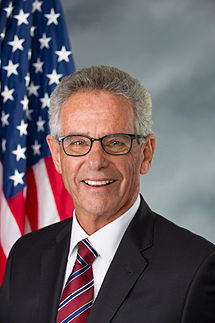 Congressman Alan Lowenthal and co-sponsor Congressman Raul Grijalva introduced Wednesday legislation that will raise the rate oil and gas companies pay for leasing public lands. The bill seeks to “ensure that the American people are being fairly compensated for the extraction of resources on public lands,” according to the release.
Congressman Alan Lowenthal and co-sponsor Congressman Raul Grijalva introduced Wednesday legislation that will raise the rate oil and gas companies pay for leasing public lands. The bill seeks to “ensure that the American people are being fairly compensated for the extraction of resources on public lands,” according to the release.
Lowenthal is the Ranking Member of the House Natural Resources Committee’s Energy and Mineral Resources Subcommittee, while Grijalva is the Ranking Member of the Natural Resources Committee.
“Companies hold roughly 50,000 oil and gas leases on over 34 million acres of onshore federal land,” said Lowenthal in a statement. “That is larger than the size of North Carolina. These bargain-basement leases offer insufficient return to the public, but allow companies to reap tremendous profits from the development of oil and gas on our public lands. The American people are getting shortchanged for the extraction of their resources.”
Lowenthal’s bill, the “Ensuring the Taxpayer a Fair Return for Federal Onshore Oil and Gas Resources Act,” would raise the onshore royalty rate from 12.5 percent to 18.75 percent, according to the release, and is the rate oil and gas companies pay the government for removing and selling publicly owned oil or gas. An increase to 18.75 percent would bring the onshore rate up to what the federal government currently charges companies for federal offshore production, according to the announcement.
Today, states like Montana, Oklahoma, and North Dakota charge a higher royalty rate for oil and gas produced on state lands than the federal government does for oil and gas produced on public lands, according to the release.
“For far too long, oil and gas companies have enjoyed big profits and easy access to public resources without paying fair royalties,” Grijalva said in a statement. “I’m glad to have Natural Resources Committee Democrats play a leading role in moving us closer to a more balanced national energy policy. President Obama rightly called last night for a better accounting of those companies’ costs to taxpayers. This bill is the next step in that process, and I look forward to continuing to build support for it with members of both parties who recognize just how overdue this change really is.”
The additional royalty revenue from the new leases would be divided between four different recipients: the individual states where the production occurs; to be used for properly remediating orphan wells; oil and gas operations inspection, and enforcement; and, the U.S. Treasury for deficit reduction, according to the release.
Project On Government Oversight (POGO) released a statement in support of the legislation, stating that the bill would “maximize taxpayer revenues by requiring oil and gas companies that extract oil and gas from federal onshore lands to pay a higher royalty rate, just as companies already do on federal offshore areas and on state lands.”
“The changes to how this revenue is distributed will provide funds to necessary orphan well remediation in addition to oil and gas well inspection and enforcement,” the group went on to say.
Lowenthal’s bill would also address the low minimum bid and rental rates for public lands. Currently, companies only have to bid $2 per acre upfront and then pay $1.50 per acre each subsequent year to secure and hold the valuable mineral rights of public lands. These rights are sometimes worth hundreds of millions of dollars. These rates were last set by Congress in the 1980s and have not been adjusted since. Lowenthal’s bill increases the minimum bid to $4 per acre and the rental rate to $3.00 per acre per year and requires these values to be periodically adjusted for inflation.
“It is important we modernize the way we do business on public lands,” Joshua Mantell of The Wilderness Society said in a statement. “The introduction of this legislation is significant. Raising oil and gas royalty rates to reflect the current value of our shared public lands and allocating money towards ensuring safe and responsible development is crucial to establishing 21st century public lands management.”
The Sierra Club Lands Protection Program and the Western Organization of Resource Councils also voiced their support of the bill.
For more information, visit Lowenthal’s website here.

